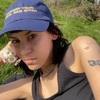Hi. This is a monthly column where I'll be writing about something I've been unhealthily obsessed with. It is basically a written accompaniment to this meme. But with more music. Thanks.My times at Dalston Superstore – the east London queer club, gallery and cafe – can be measured on a very broad scale, from incredible to worst ever. There was the time I met up with a girl from Tinder, only to realise she’d arrived with her girlfriend who she hadn't mentioned and three other randoms, also from Tinder. There was the night I found a chocolate birthday cake under a table and ate the whole thing with my hands. I have cried in the techno room downstairs. I have danced on the table tops to “Babycakes” by 3 of a Kind. I have left at 3AM, only to return seven hours later for scrambled eggs and coffee, eyes glued shut with mascara, half asleep on the menu.
Advertisement
Obviously the aforementioned could apply to anyone, at any local club (minus maybe the breakfast), in any decade or location. But Dalston Superstore – which opened ten years ago and isn’t shutting down yet to my knowledge, btw, don’t panic! – is particularly special because it is one of London’s last great remaining queer clubs. In the past decade alone more than half of them have closed in the capital and they will probably continue doing so. As we’ve already discussed at length, a steady combination of rising rents, redevelopment, dating apps and general assimilation has meant the practicality and purpose of such spaces have narrowed. Simply put: the fact Superstore continues to thrive today feels like a weird anomaly – one that’s worth celebrating (if it doesn’t get nixed by Hackney’s new killjoy licencing laws!)There are other great LGBTQ spaces still standing of course – Vogue Fabrics, Savage, The Glory and The Queen Adelaide to name just a few. But what makes Superstore different is the way in which it functions. You can dance all night to Ashley Simpson B-Sides, knock back cheap tequila and make out with someone wearing detachable denim wrist cuffs if you feel so inclined. But you can also drink coffee with your friends at 11AM. Or you can go there alone, just to peep the art on the walls, which is all by LGBTQ artists. On Sunday mornings, you can request power ballads. If it’s your birthday, staff have been known to run to the shop and buy you a cake. In other words, Superstore has become a community space, of sorts, in as much as it is a nightlife spot. I can’t think of another place in the city that operates in quite the same way.
Advertisement
Despite the fact we’re all so regularly connected online, queer loneliness is a real thing. A Stonewall study from 2011 points out that LGB people over the age of 55 are three times more likely to be single, three times less likely to have kids, two times more likely to live alone and twice less likely to see biological family than their straight pals. Meanwhile, statistics from 2017 found that attacks on LGBTQ people had surged by nearly 80% over the past four years, while the London Assembly found that 40% experience mental health problems, compared to 25% of the wider population. This isn’t to paint the queer experience as negative – that would be inaccurate, obviously – but it does go to show that safe, inclusive spaces are still necessary. Online communities are amazing, but to be physically surrounded and supported by people whose life experiences resemble your own is something else entirely.The importance of fostering physical, IRL queer communities is something that has been brought to the forefront again recently with the campaign to open a new LGBTQ centre in Hackney. According to its organisers, this centre would become a work and social space, with facilities for performances, exhibitions and accessible information about things like sexual health, transitioning and mental health support. The last time a centre such as this existed was back in 1985, when Ken Livingstone helped launch The Black Lesbian and Gay Centre, funded by The Greater London Council (GLC), but that was forced to close just six years later due to the financial strain. Since then, though, venues that have the capability to act as lifelines for people are minimal – which is more than a shame, it’s a tragedy.I’m not saying Dalston Superstore even slightly provides the same things as an actual community centre – regardless of how many reckless nights and hungover brunches occur within its painted walls, it is still just a club with a door fee and a dancefloor. The club only really caters for a certain section of the community (you’d be hard pressed to find any sober, elderly gays in there that’s for sure) and their support for things like sexual health go as far as handing out free condoms (which is why I have so many glow in the dark durex gathering dust in my bedroom drawers). Nightclubs can never be replacements for, say, adequate healthcare for trans kids or a chill place to go for Christmas. Rather, Superstore – and spaces like it – are another brick in a wall of support for LGBTQ people that is slowly being dismantled.The only time we ever speak about queer nightlife is to remind everyone that it’s dying. And fresh off the news that Alibi and Visions Video Bar are closing down soon, the east London area in general seems to be dying too. But let’s take a moment to savour and celebrate what we do have, which is a place that might just go down in history as one of London's last great queer clubs. It's not history yet, though. Meet you at the bar.You can find Daisy on Twitter and Esme on Instagram.
